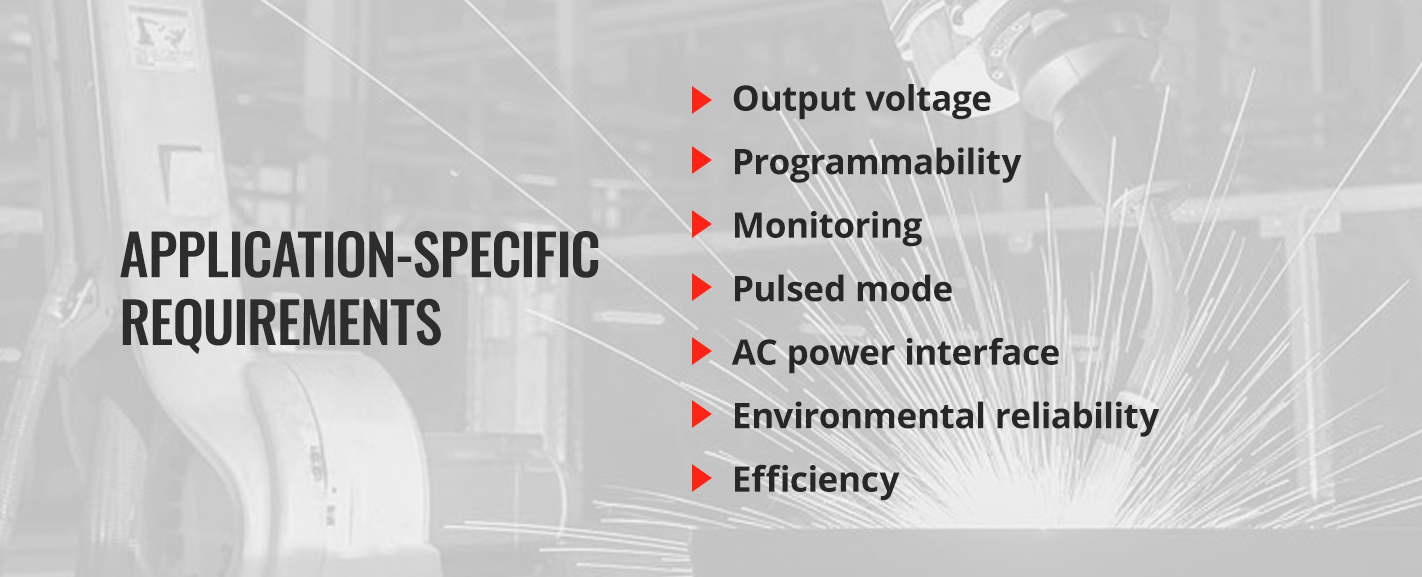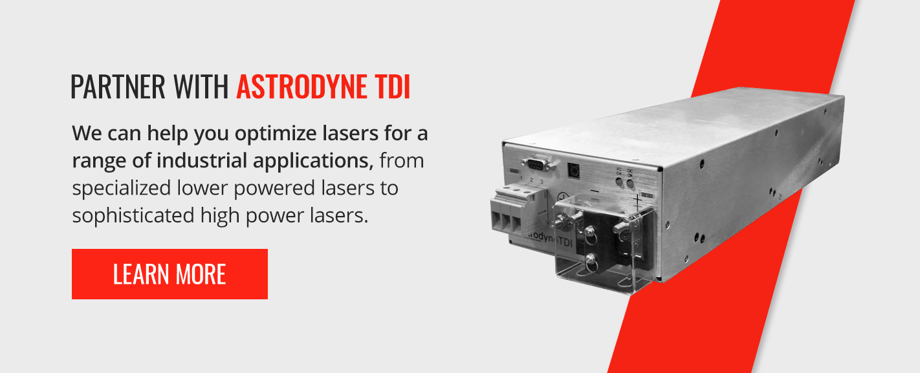RESOURCES
Power Supplies for Laser Applications
Laser technology has only been around for a few decades, but in that time, lasers have become essential in a massive number of applications. From manufacturing and scanning technology to medical and scientific tools, laser technology has become indispensable. The key to these laser applications is a power supply that can support the application.
Lasers are optical devices that generate intense beams of radiated light. The unique properties of this beam of light, including coherence, monochromaticity, directionality and intensity, make lasers a powerful tool for various applications. In many industries, lasers can replace older, less-efficient processes and even accommodate automation.
Lasers Applications
Depending on the laser power, there are many different uses for lasers in medical, military, semiconductor manufacturing and industrial equipment. Lasers are widely used for material processing which includes marking, etching, engraving, welding, cutting to a wide range of materials such as fabrics, plastics, glass, and metals. As laser power increases, the Military can use laser weapon systems to defend against larger threats across greater distances. Modern medicine utilizes laser technology in the form of dental lasers and medical lasers for surgeries such as optical procedures.
High Power Laser Applications
High-power lasers can deliver massive amounts of directed energy ranging from hundreds of watts to tens of thousands of watts. These lasers are commonly used for material processing and machining. Some common examples of applications include:
- Automotive: Lasers are often used to cut out car parts and may also be used for heat treatment.
- Electrical: Lasers are applied to integrated circuits to trim components.
- Textile: High-power lasers are often used in the textile industry to cut large amounts of cloth into patterns at once or to distress fabrics.
- Packaging: Date codes are often printed using lasers.
Low Power Laser Applications
Low power laser applications use lasers that emit smaller amounts of energy. This category is relatively broad and applies to a range of lasers used in commercial and specialized industries. Some common applications include:
- Consumer products: Consumer products utilize lasers in a range of products. Some work as directional lightbulbs, like those in toys or laser pointers. Others, such as those used in CD players, are used for communicating or processing information. Laser printers are another common example of a consumer product that utilizes laser technology.
- Life science: Lasers are often used for scanning and measuring purposes in the sciences. For example, laser microscopes are often used to generate high-resolution images of cells.
- Measurement: Lasers are an increasingly common component of measuring tools and can be used as measuring or leveling tools for large areas.
- Medical: Low power lasers are often used in the medical field and are applied to a range of disciplines. Laser technology is used in fiber-optic endoscopes for endoscopic surgeries. Lasers are also used in various surgeries, including optical and dental surgeries. They can be used for therapeutic and cosmetic purposes, including cancer treatments, acne treatments and hair removal.
Unique Requirements of Lasers
For lasers to function effectively, their power supplies must maintain accurate and stable performance. This entails meeting specific requirements such as precise voltage and current control, repeatability, and scalability, among others.- Accuracy: The power supply should keep the voltage and current within the allowed range.
- Stability: The power supply should ensure the voltage and current is maintained with little to no variability.
- Repeatability: The power supply should operate at the same voltage and current with each use.
Accuracy, stability, and repeatability in a power supply are important because if the current of a power supply changes, the optics in the laser can be damaged. Steady voltages avoid large changes in current, protecting the integrity of the laser optics.

Additional Power Supply Requirements
In addition to these core requirements, specific applications may have unique requirements depending on the usage and operating environment. Some of these include:
- Programmable Output: The optimal performance of a laser may be at a unique voltage, like 36V, 77V, etc. These requirements may not be met by off-the-shelf power supplies which are usually designed to be optimized around 24V or 48V. Programmable power supplies offer flexibility to support a wide range of output voltages for ideal process performance. Additionally, Laser Diode Power Supplies require a constant current source to deliver exactly the requested current to the laser diode.
- Control Interface: Manufacturers need a power supply that is adaptable to their preferred control interface, whether that’s analog controls or high-speed, near real-time, digital controls (ie. MODBUS TCP, EtherCat, Profinet, CANBUS, etc.). The Laser Power Supply should adapt to the system – not the system to the power supply.
- Pulsed mode: Some applications, such as welding and material processing, may need to operate in pulsed mode, which increases peak output power requirements. In these applications, pulse rates can present a risk of thermal fatigue to power supplies. The power supply for such applications must be designed to handle these conditions.
- AC power interface: In industrial environments, laser power supplies can encounter difficult AC line conditions. Power Supply susceptibility to utility transients must be accounted for to prevent harm to the integrity of the laser equipment. Power supplies need to be able to manage fluctuations to ensure operability and reliability over time.
- Efficiency: Power supply efficiency is a critical consideration in any application. Efficiency is the ratio of total output power to input power. If a power supply is operating at 50% efficiency, the remaining 50% of input power is wasted, mostly as heat. Efficient power supplies not only save on cost but reduce the risk of thermal degradation.
- Scalability: Power supplies that can be scaled from one kilowatt to hundreds of kilowatts can be used in parallel across a broad range of laser powers.
- Environmental reliability: Lasers may operate in a range of industrial environments. Lasers used in semiconductor manufacturing may operate in a clean room where it is crucial environmental pollutants don’t contaminate the space. In industrial applications such as metal cutting on manufacturing floors, the environment may be very dirty with excessive dust and debris present. Other environmental factors to consider include humidity, temperature, and altitude. When selecting a power supply, it is important to keep the needs of your application in mind. If you're exploring options and looking for expertise to inform your choice, work with a specialist from Astrodyne TDI.
Liquid-Cooled Power Supply for Laser Applications
Liquid-cooled power supplies for industrial laser applications utilize a closed loop of cool liquid to regulate temperature. Utilizing a liquid-cooled power supply presents significant benefits to industrial applications, including:
- Improved power density: Optimized liquid-cooled power supply designs can help improve the power density of the unit. This allows less volume for the same amount of power to support the power conversion requirements of the application.
- Ingress Protection: A closed cooling system means that the power supply is sealed. This means that no contaminants can get in or out, allowing the power supply to operate effectively in both clean and dirty environments.
- Temperature Gradient: Because of the greater heat capacity of liquid, the temperature gradient within the unit is smaller, enabling users to control the actual temperature of components in a more precise fashion.
- Noise reduction: Airflow-based cooling methods at high power levels require the use of a fan that produces audible noise. Liquid-cooling provides a quieter environment, which is beneficial in enclosed spaces or where operators/personnel need to communicate with one another.
Astrodyne TDI is a world leader in liquid-cooled technology with more than 30+ years of experience designing liquid-cooled solutions. Astrodyne TDI’s latest solution, LiquaCore, is the 7th Generation of Liquid-Cooled Design. If you're interested in exploring more about liquid-cooled power supplies, contact Astrodyne TDI to learn more about our liquid-cooled solutions, including the LiquaCore.
Partner With Astrodyne TDI
If you're looking for a resource for laser power supplies, Astrodyne TDI can help.
Astrodyne TDI is an industry leader in the design and manufacturing of power solutions. With over 60 years in the power industry, a staff of highly experienced professionals and a global reach, we specialize in creating valuable solutions to meet our client's unique needs. We can help you optimize lasers for a range of industrial applications, from specialized lower powered lasers to sophisticated high power lasers. Contact Astrodyne TDI today to learn more about how we can assist you with your laser needs.


